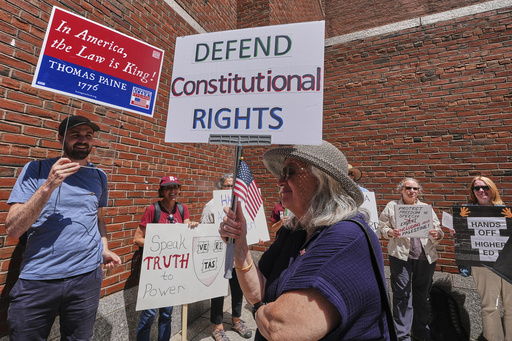In an intense legal battle unfolding in Boston, Harvard University appeared in federal court Monday to challenge a significant funding cut imposed by the Trump administration. The Ivy League institution argued that the government unlawfully slashed $2.6 billion in federal funding, an action framed as part of a broader sanction initiative aimed at the university known for its historic prominence and substantial financial resources.
Since taking office, President Trump’s administration has targeted various universities, including Harvard, with criticisms and sanctions, accusing the school of fostering liberal ideals and notions of antisemitism. This ongoing legal case is closely monitored by institutions in higher education and beyond, as it represents a major stand-off between Harvard and federal directives.
During Monday’s proceedings, Harvard’s attorney, Steven Lehotsky, emphasized the core issue as governmental overreach into the university’s autonomy. According to Lehotsky, the withheld funds threaten ongoing research, potentially damaging careers and leading to the closure of various laboratories.
“It’s about the government’s behavior towards Harvard, not the other way around,” Lehotsky argued, affirming the institution’s stance.
The case is being presided over by U.S. District Judge Allison Burroughs, who previously dealt with similar lawsuits from Harvard, including efforts by the Trump administration to block international students. Harvard is currently urging her to overturn a series of funding freezes, which if repealed, would rejuvenate Harvard’s sprawling research initiatives across numerous scientific and medical disciplines.
The government’s position, as presented by lawyer Michael Velchik, claims that the decision to cut funds was within its legal rights, asserting that the grants were reduced due to their alleged misalignment with Trump’s executive order targeting antisemitism. Velchik, himself a Harvard alumnus, defended the action stating that it stemmed from incidents of antisemitism on Harvard’s campus, especially following the Hamas-led attacks on Israel in October 2023. He maintained that the government’s decisions were in support of Jewish students and faculty at Harvard.
However, Judge Burroughs expressed skepticism towards the government’s basis for these funding cuts. She pointed out the absence of documented evidence linking any of Harvard’s funded research to antisemitism. Her concerns focused on the idea of making “ad-hoc” decisions without formal procedures, describing such governmental actions as “mind-boggling.”
Burroughs questioned, “I don’t think you can justify a contract action based on impermissible suppression of speech. Where do I have that wrong?” indicating her unease with the constitutional ramifications of the government’s approach.
Harvard’s lawsuit portrays the cuts as a form of retaliation by the Trump administration following the university’s refusal to comply with demands from a federal antisemitism task force. These demands centered on large-scale changes in campus policy regarding protests, academics, and admissions, such as assessing the ideological diversity of students and faculty.
The university’s president, Alan Garber, reiterated institutional resistance, asserting that government should not interfere with private universities’ curriculum decisions, nor their hiring or admissions policies. The hearing concluded without an immediate ruling from Judge Burroughs, though a written decision is anticipated.
Outside the courtroom, Harvard’s resolve garnered support from faculty, students, and alumni. Demonstrators held signs with messages like “Hands Off Harvard” and “Our Liberty Is Not For Sale,” illustrating solidarity against the funding cuts. Alumni like Anurima Bhargava, representing thousands of Harvard graduates, emphasized the broader implications of the case on educational freedom.
Three Harvard researchers who experienced funding losses expressed concerns over the potential long-term impacts on various health research initiatives. Walter Willett, a professor of epidemiology and nutrition, highlighted the severity of cutting critical funding aimed at significant health research, emphasizing American and global well-being.
The funding cut forms part of broader tensions between Harvard and the Trump administration. Beyond restricting federal research funds, the administration previously threatened to bar international students and considered revoking the university’s tax-exempt status. Harvard, which holds the largest endowment of any educational institution in the nation, has attempted to self-fund some research initiatives but cannot completely cover the federal shortfall.
In a provocative follow-up to the hearing, President Trump used his social media platform, Truth Social, to criticize Judge Burroughs, calling her handling of the case a “TOTAL DISASTER.” He accused Harvard of harboring anti-Semitic sentiments, unfairly benefiting from significant federal funds at the expense of other institutions.
The outcome of this legal battle is not only pivotal for Harvard University but carries significant implications for the wider landscape of higher education and federal funding policies.


